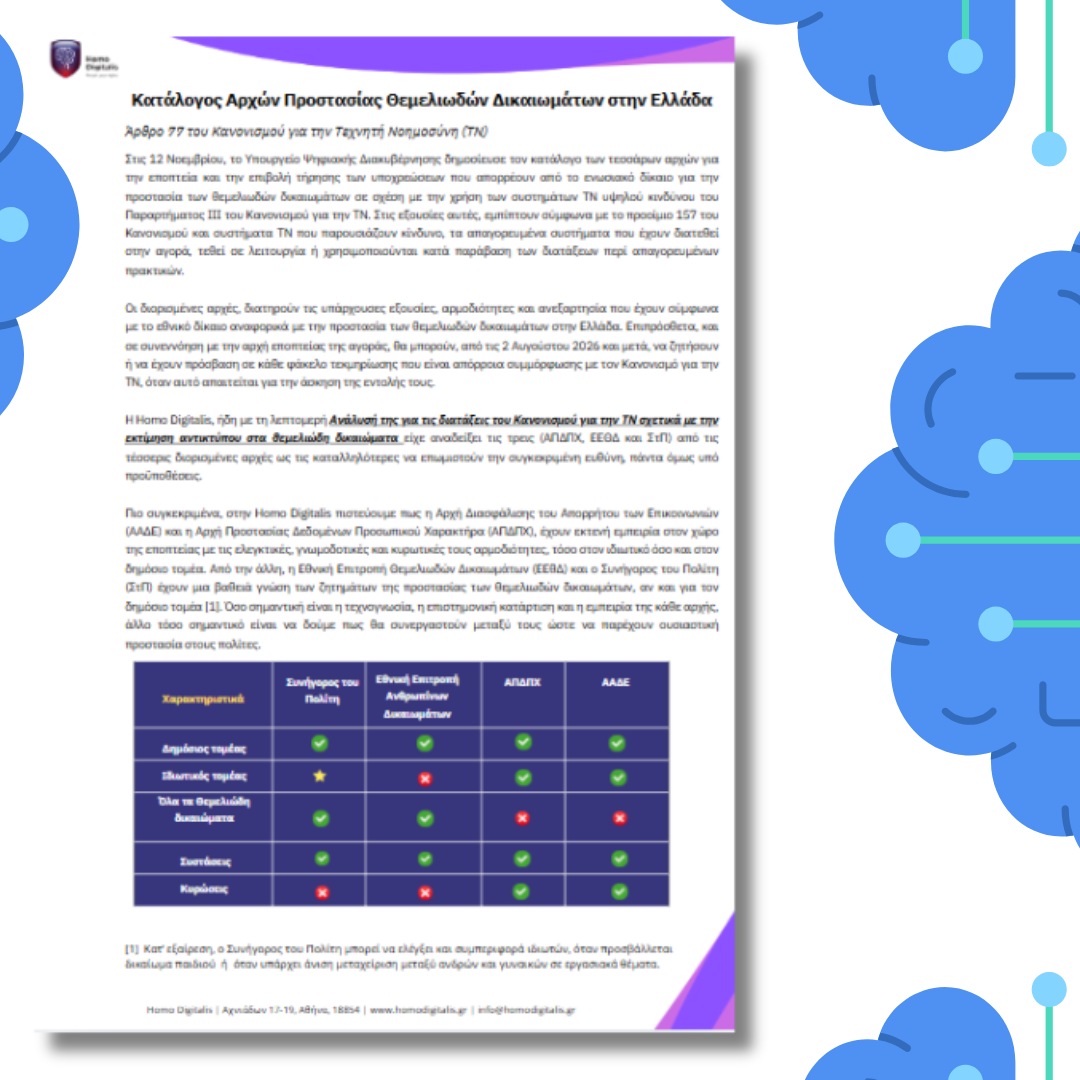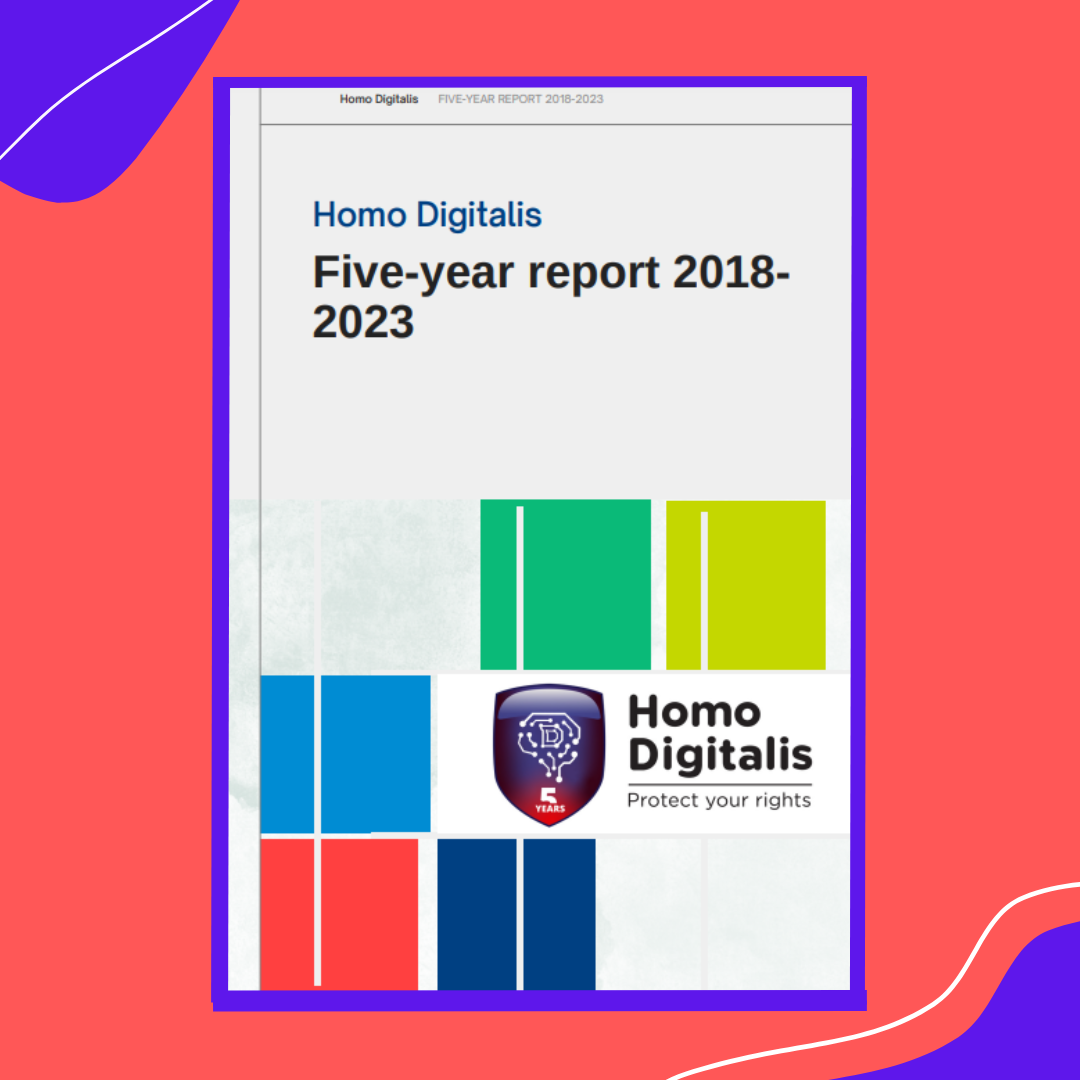We are actively involved in the enforcement of the AI Act in Greece
On Tuesday 12 November, the Ministry of Digital Governance published the list of national authorities and bodies that enforce or supervise compliance with EU obligations to protect fundamental rights under Article 77 of the AI Regulation, appointing the Hellenic Authority for Communication Security and Privacy (ADAE), the Greek Data Protection Authority (DPA), the Greek National Commission for Human Rights (GNCHR) and the Greek Ombudsman (Ombudsman).
Already on 25 October, Homo Digitalis with its study “Analysis and proposals for the incorporation of the provisions on fundamental rights impacts assessment of the AI Act in Greece” had developed in detail its position on this issue and the related provisions.
If you did not have time to read the full text of our study, we have prepared a one-page summary of the National Fundamental Rights Authorities here.
We underline that this publication by the Ministry of Digital Governance was both the first obligation for the implementation of the AI Act at the national level and the first step in the creation of an effective national AI governance and oversight system. A second and most important obligation is that of the institutional design of the market surveillance authorities which, according to Article 113(b) of the AI Regulation, should be completed by August 2, 2025. By then, the notifying authorities should also be appointed.
Homo Digitalis has been researching this issue for months now and we will soon publish our detailed analysis!
Our purpose? To assist decision makers with our expertise in the relevant issues, as well as to equip other Civil Society organizations in Greece with arguments and knowledge!
Homo Digitalis participates in the European Commission Plenary meeting on the AI Act
September ended with important meetings for Homo Digitalis in the context of the European Regulation on Artificial Intelligence (AI Act) at European level!
Specifically, on September 30th we participated online in the first meeting organized by the AI Office of the European Commission regarding the development of a Code of Practice for General-Purpose AI Systems “Kick-off Plenary: Code of Practice for General-Purpose AI”.
Homo Digitalis has been selected to participate in the relevant working groups that will be formed in order to collaborate with Civil Society organisations and other stakeholders in the coming months in this mission to develop this Code.
We were represented at the online meeting by our Director for AI and Human Rights Lamprini Gyftokosta and our co-founder Eleftherios Chelioudakis.
We co-organize and participate in the Tech & Society Summit in Brussels
The Tech and Society Summit is approaching and will take place on Tuesday, 1st October in Brussels! This exciting conference, co-organized by EDRi in collaboration with Homo Digitalis and over 40 other organizations, will bring together leading experts, policymakers, and human rights advocates to discuss the intersection of technology and societal impacts in Europe. The summit will cover critical issues, ranging from digital rights and climate change to AI regulations, contributing to the shaping of a fair and equitable digital future for all.
We are excited that Eleftherios Chelioudakis will represent Homo Digitalis as a speaker at the session Visionary Roundtable: Building an EU Digital Enforcement Strategy. With important laws such as the Digital Markets Act (DMA), Digital Services Act (DSA), and AI Act, Eleftherios will highlight the actions of Homo Digitalis, discussing how these regulations can effectively protect rights and boost Europe’s competitiveness in the digital space.
Additionally, Homo Digitalis has been invited to participate in the session Fundamental Rights in Focus: Joint Efforts for Spyware Regulation in the EU, co-organized by the Centre for Democracy & Technology Europe (CDT Europe) and Amnesty International. In this session, key policymakers and civil society representatives will meet to explore ways to regulate spyware in the EU, and we will discuss our experiences from the latest related developments in Greece.
You can read more about the Tech and Society Summit and view its program here.
Homo Digitalis met with representatives of the Ministry of Digital Governance for the national implementation of the AI Act
September started with important meetings for Homo Digitalis in the context of the European Regulation on Artificial Intelligence (AI Act) at national level!
Specifically, on September 4, we had the honor to meet with the Ministry of Digital Governance and its representatives Mr. Vassilis Karkatzounis and Mr. Papagiotis Papaspiliopoulos in order to exchange views on the implementation of the AI Act in Greece. We were represented at the meeting by our Director for AI and Human Rights issues Lamprini Gyftokosta and our co-founder Eleftherios Chelioudakis. We would like to thank the representatives of the Ministry for their positive response to our request for a meeting, the and the very fruitful dialogue!
Translated with DeepL.com (free version)
Homo Digitalis Submits Urgent Letter to the Council of Europe’s Commissioner for Human Rights
Homo Digitalis submitted today a letter to the Council of Europe’s Commissioner for Human Rights.
We this letter, the Greek CSO aims to draw the Commissioner’s attention to the following three issues:
A. The imminent adoption of a Presidential Decree in Greece permitting state authorities to procure spyware.
B. The deteriorating condition of independent supervisory authorities in Greece, plagued by power struggles, understaffing, and financial constraints.
C. The latest developments in the ongoing PREDATOR scandal in Greece, which leaves critical questions unanswered regarding the surveillance of journalists, politicians, and lawyers through illegal means.
Moreover, with this letter Homo Digitalis urges the Commissioner:
- To give full and close attention to the situation in Greece,
- To take into account the facts presented above and urgently request further information and clarifications from Greek authorities,
- To examine the situation in Greece and take necessary steps to identify any shortcomings in the law and practices concerning human rights abuses, and
- To assist in strengthening the activities of national supervisory institutions and other human rights structures in Greece.
Learn more about the Council of Europe's Framework Convention on Artificial Intelligence, in the drafting of which Homo Digitalis was actively involved.
The Council of Europe has published an important overview of the “Framework Convention on Artificial Intelligence and Human Rights, Democracy and the Rule of Law,” the first international legally binding instrument for AI.
The AI Treaty “aims to ensure that activities within the lifecycle of artificial intelligence systems are fully consistent with human rights, democracy and the rule of law, while being conducive to technological progress and innovation.”
For more than 4 years, since July 2020, Homo Digitalis has been actively involved in the relevant processes of the Council of Europe, initially participating in the CAHAI (Ad Hoc Committee on Artificial Intelligence) in the Policy Development and Legal Frameworks Working Groups, and subsequently in the Council of Europe’s Committee on Artificial Intelligence (CAI). Throughout this period, we had the honor of closely collaborating with civil society organizations, academic experts, member delegations, the Presidents of the Committees and Working Groups, and the Secretariat of the Council of Europe’s Committee on Artificial Intelligence in the development of the AI Convention.
Our co-founder and Executive Director, Eleftherios Chelioudakis, has represented Homo Digitalis in the relevant processes for the past 4 years.
Despite the limitations in the text of the Convention, which we have discussed in detail, we eagerly anticipate its adoption and implementation by the Member States of the Council of Europe. The treaty will be open for signature on September 5, 2024.
You can read the related overview here.
We want access to essential services to be guaranteed offline too!
In the beginning of June, Homo Digitalis joined a large number of orgsanisations calling the European Commission, the Council of the European Union and the European Parliament to guarantee access to essential services offline!
Public administration, banks and energy suppliers, as well as employers, health providers and more, have moved online, and counters, mail services and phone lines are disappearing. Yet, more than 40% of Europe’s population still lacks basic digital skills, preventing them from accessing certain essential services. There is an urgent need to guarantee multichannel (incl. off-line) access to all essential services.
Yu can sign the related open letter here.
The coordinator of this action is Lire et Écrire, a Belgian based literacy organization. Since 1983, the organization provides free literacy trainings and research on illiteracy and literacy processes.
We published our successful Report for the five-year period 2018-2023
In 2018, we started with 6 founding members, 25 volunteers and 1,000 euros in the organization’s account. Nobody knew us, but we knew what we wanted to achieve, what gap we were trying to fill, where we wanted to go.Today, we celebrate our 6 years of operation and publish our 5-year report, about everything we have achieved in the period 2018 -2023. The detailed Report contains the beginning of our story, information about the mission, vision and values of Homo Digitalis, and a thorough review of all our major successes by pillar of action, namely a) Awareness, b) Advocay , and c) Legal Actions and Interventions. Finally, in order to enhance transparency about our financial accounts, we have also included all of our Financial Reports for the entire five years period!
You can read our Homo Digitalis’ “Five Year Report 2018-2023” in Greek here or in English here. The report was curated by our Director on Human Rights and AI, Lambrini Gyftokosta.
Looking back we are happy, proud and excited, because until the summer of 2023, we: gained over 130 volunteers, have steadily increased our revenue by 353% every year, filed over 20 complaints with Greek and European authorities, managed to fine Clearview AI €20 million (the largest in Greece), visited more than 30 schools and raised awareness with our actions for more than 3500 students and citizens, gave more than 40 media interviews in Greece and Europe, supported more than 50 joint actions with other Greek and European organisations in the field of digital rights, acquired more than 10.000 followers on social media (LinkedIn, Facebook, Instagram, X), published more than 150 articles of scientific, technical and legal interest on our website with the contribution of our volunteers, became the first and only organisation from Greece to be a member of EDRi, the European Digital Rights Network; and although we started as a purely voluntary organisation, we managed to hire our first employee!
On this journey we were not alone. One of our greatest successes is our collaboration with a large network of universities, organisations, institutions, research centres and all our member volunteers who helped us take our actions one step further!
Looking ahead we are optimistic. We are moving forward dynamically, conquering small and big goals that will bring us even closer to the world we dream of and want to build together!
Our new action before the European Data Protection Board on its case regardin Meta's Pay Or Okay model
Last Thursday, 7 March, together with European Digital Rights and other important civil society organisations, we submitted an Open Letter to the European Data Protection Board (EDPS) on Meta’s #PayOrOkay model.
We call on the EDPS in its opinion to condemn these commercial subscription models that allow those with the money to pay for their privacy and those without to be at the mercy of the voracious data collection practices of big tech companies.
You can read our letter in detail here. This is Homo Digitalis’ second relevant action against Meta’s Pay or Okay model on a pan-European level.








